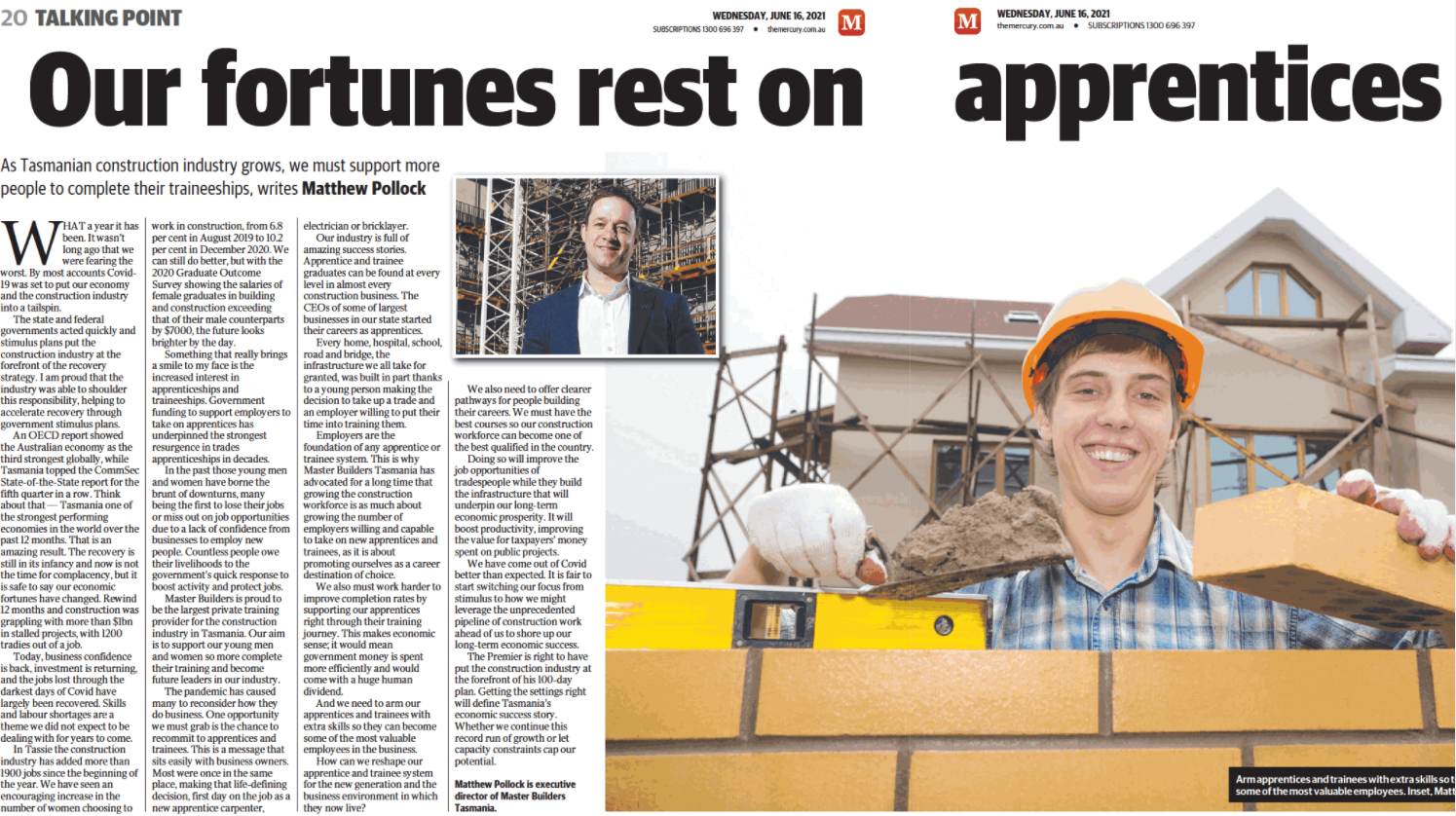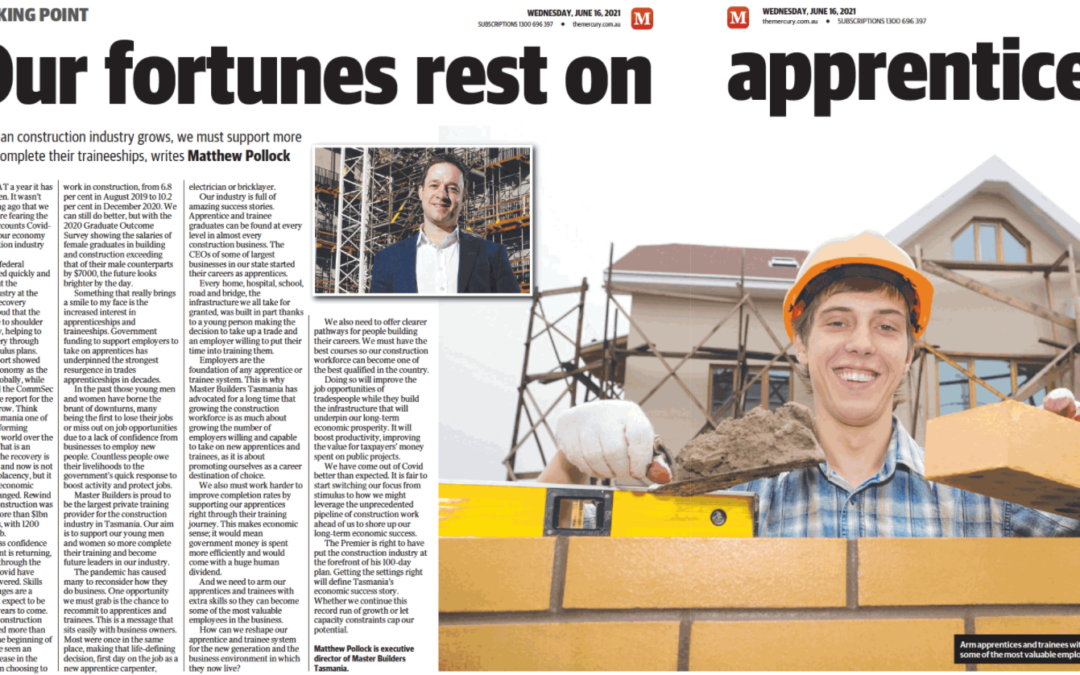As Tasmanian construction industry grows, we must support more people to complete their traineeships,
WHAT a year it has been. It wasn’t long ago that we were fearing the worst. By most accounts Covid-19 was set to put our economy and the construction industry into a tailspin.
The state and federal governments acted quickly and stimulus plans put the construction industry at the forefront of the recovery strategy. I am proud that the industry was able to shoulder this responsibility, helping to accelerate recovery through government stimulus plans.
An OECD report showed the Australian economy as the third strongest globally, while Tasmania topped the CommSec State-of-the-State report for the fifth quarter in a row. Think about that — Tasmania one of the strongest performing economies in the world over the past 12 months. That is an amazing result. The recovery is still in its infancy and now is not the time for complacency, but it is safe to say our economic fortunes have changed. Rewind 12 months and construction was grappling with more than $1bn in stalled projects, with 1200 tradies out of a job.
Today, business confidence is back, investment is returning, and the jobs lost through the darkest days of Covid have largely been recovered. Skills and labour shortages are a theme we did not expect to be dealing with for years to come.
In Tassie the construction industry has added more than 1900 jobs since the beginning of the year. We have seen an encouraging increase in the number of women choosing to work in construction, from 6.8 per cent in August 2019 to 10.2 per cent in December 2020. We can still do better, but with the 2020 Graduate Outcome Survey showing the salaries of female graduates in building and construction exceeding that of their male counterparts by $7000, the future looks brighter by the day.
Something that really brings a smile to my face is the increased interest in apprenticeships and traineeships. Government funding to support employers to take on apprentices has underpinned the strongest resurgence in trades apprenticeships in decades.
In the past those young men and women have borne the brunt of downturns, many being the first to lose their jobs or miss out on job opportunities due to a lack of confidence from businesses to employ new people. Countless people owe their livelihoods to the government’s quick response to boost activity and protect jobs.
Master Builders is proud to be the largest private training provider for the construction industry in Tasmania. Our aim is to support our young men and women so more complete their training and become future leaders in our industry.
The pandemic has caused many to reconsider how they do business. One opportunity we must grab is the chance to recommit to apprentices and trainees. This is a message that sits easily with business owners. Most were once in the same place, making that life-defining decision, first day on the job as a new apprentice carpenter, electrician or bricklayer.
Our industry is full of amazing success stories. Apprentice and trainee graduates can be found at every level in almost every construction business. The CEOs of some of largest businesses in our state started their careers as apprentices.
Every home, hospital, school, road and bridge, the infrastructure we all take for granted, was built in part thanks to a young person making the decision to take up a trade and an employer willing to put their time into training them.
Employers are the foundation of any apprentice or trainee system. This is why Master Builders Tasmania has advocated for a long time that growing the construction workforce is as much about growing the number of employers willing and capable to take on new apprentices and trainees, as it is about promoting ourselves as a career destination of choice.
We also must work harder to improve completion rates by supporting our apprentices right through their training journey. This makes economic sense; it would mean government money is spent more efficiently and would come with a huge human dividend.
And we need to arm our apprentices and trainees with extra skills so they can become some of the most valuable employees in the business.
How can we reshape our apprentice and trainee system for the new generation and the business environment in which they now live?
We also need to offer clearer pathways for people building their careers. We must have the best courses so our construction workforce can become one of the best qualified in the country.
Doing so will improve the job opportunities of tradespeople while they build the infrastructure that will underpin our long-term economic prosperity. It will boost productivity, improving the value for taxpayers’ money spent on public projects.
We have come out of Covid better than expected. It is fair to start switching our focus from stimulus to how we might leverage the unprecedented pipeline of construction work ahead of us to shore up our long-term economic success.
The Premier is right to have put the construction industry at the forefront of his 100-day plan. Getting the settings right will define Tasmania’s economic success story. Whether we continue this record run of growth or let capacity constraints cap our potential.
Matthew Pollock is executive director of Master Builders Tasmania.


